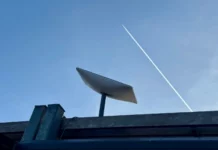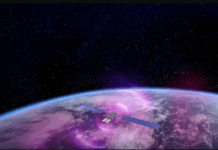Amazon has a lot of catching up to do when it comes to building a constellation of Internet satellites in low Earth orbit, but the company has successfully launched its first mission in an effort to compete with industry giant SpaceX.
The Kuiper-1 mission launched on Monday at 19:01 EST from Cape Canaveral in Florida. The first batch of 27 satellites was packed into a United Launch Alliance (ULA) Atlas V rocket to inaugurate the long-developed Kuiper constellation. “All Kuiper-1 satellites have been successfully launched into space,” the company wrote on social media platform X a few hours after the launch.
The next day, Amazon confirmed that the mission was off to a good start and the satellites were working as expected. “We have already made contact with all 27 Kuiper satellites in orbit, and the initial deployment and activation sequences are proceeding as planned,” the company announced.
The Kuiper satellites will orbit at an altitude of 367 to 391 miles (590 and 630 kilometers) above the Earth. The satellites are equipped with an active propulsion system, which includes a special engine of its own design and a krypton tank filled with fuel to combat atmospheric drag and maintain the satellite’s altitude within 5.6 miles (9 km) of the target operating orbit.
The Kuiper project is Amazon’s answer to Starlink, a satellite network that provides fast and affordable Internet connectivity in different parts of the world. The initiative has experienced several delays: the company originally planned to deploy the first satellites in early 2024. Amazon is also facing a time crunch due to a 2020 FCC order that requires the company to launch 50% of the Kuiper satellites by 2026 and the rest by 2029. If it does not meet the deadline, Amazon will likely be forced to apply for an extension.
Meanwhile, SpaceX has launched more than 7,000 Starlink satellites into space and is already providing high-speed internet in 70 countries. Unlike his rival, space billionaire Elon Musk, Jeff Bezos hopes to launch a total of 3,200 low-orbit satellites, securing 80 future launches with several commercial providers, including Arianespace, ULA, and Bezos’ other space venture, Blue Origin, to form his initial constellation.
Amazon has already launched two prototype satellites, KuiperSat-1 and KuiperSat-2, on an Atlas V rocket in late 2023. The test mission was a success, with both satellites performing controlled maneuvers in low Earth orbit. “There is room for many winners here,” Bezos said in an interview with Reuters. “I predict that Starlink will continue to be successful, and I predict that Kuiper will also be successful.”









